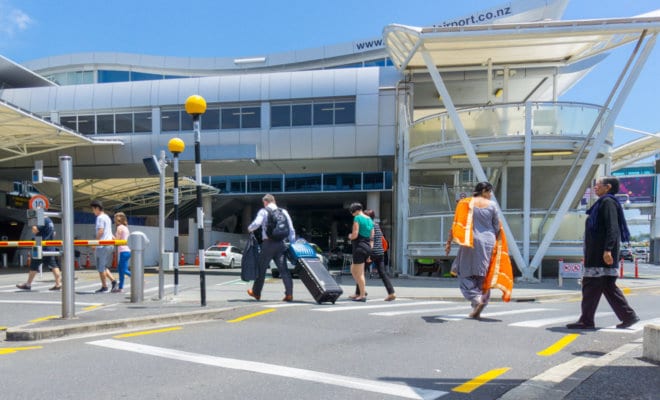Education
New Zealand Brings Changes in Post-Study Work Visas for Foreign Students

Auckland airport in New Zealand
Photo: Bigstock
The New Zealand government has decided to remove employer assisted post-study visas at all levels.
The New Zealand government has announced changes in its immigration policy for foreign students, making it harder for them to take up work in the country after they finish studies. The new rules, which will impact the post-study working rights of international students, will come into effect from Nov. 26, 2018.
Under the new changes, the employer assisted post-study visas will be removed at all levels, the government announced on Aug. 8. International students can currently get a two-year work visa in New Zealand if they are offered a full-time work by an employer after they complete their studies. The removal of the system will help “reduce the risk of migrant exploitation, and better protect New Zealand’s international reputation,” Immigration Minister Iain Lees-Galloway said.
Foreign students can currently receive specific work rights if they are sponsored by an employer. The new changes will remove employer-assisted work visas.
“We want to get rid of employer-assisted visa because we think that’s a source of exploitation. Let’s just replace it with three years overall,” the minister told The PIE News.
These changes are also aimed at finding a way to better match skills to the demands of New Zealand businesses, Lees-Galloway said. “Our changes will support the attraction of international students studying at higher levels of study, and those who undertake high quality sub-degree courses that deliver the skills needed in our growing economy,” he told Radio New Zealand (RNZ).
Students pursuing lower levels of qualifications such as certificates or diplomas, who have so far been eligible for two-year post-study work, will now be able to get a one-year post-study visa. An additional year will be allowed for diploma graduates who are working towards registration with a professional or trade body. Also, the time limit will be extended to two years if they study outside Auckland, provided their study is completed by December 2021.
The move is aimed at providing students the incentives to study and work in other regions, Lees-Galloway said.
The reduction in the time limit is said to have been prompted by concerns that people take up lower-level courses in order to gain backdoor entry to immigration.
International students earning higher qualifications such as a bachelor’s degree or post-graduate degree will be able to get a three-year work visa.
The rules will also affect partners of international students. After the new rules are implemented, only partners of those pursuing post-graduate qualifications that are specified on the Long Term Skills Shortage list will be eligible for an open work visa, and the partners’ dependent children for fee-free domestic schooling.
The changes will not affect students who are currently pursuing courses in New Zealand. “These changes will be grand-parented, so they will not impact current post-study work visa holders or current students who are undertaking a qualification that (once completed) will meet the qualification requirements as set out in current immigration settings,” the statement said.
The changes were welcomed by immigrant organizations.
The new rules will address the concerns of students arriving on employer-assisted visa, who were trapped in under-paid jobs and forced to pay thousands of dollars for a visa, Anu Kaloti, from the Migrant Workers Association, told Radionz. “A majority of the cases where the migrant workers have been exploited has been where the worker’s visa has been attached to that particular employer,” she said.
Union Network of Migrants (UNEMIG) also said that the network’s members were happy to see that their concerns were addressed by the immigration minister.
“These changes will ensure that unscrupulous employers will not be able to undermine good employers, exploit international students and wages and conditions for all New Zealanders,” UNEMIG coordinator Mandeep Bela posted on the group’s Facebook page.




You must be logged in to post a comment Login